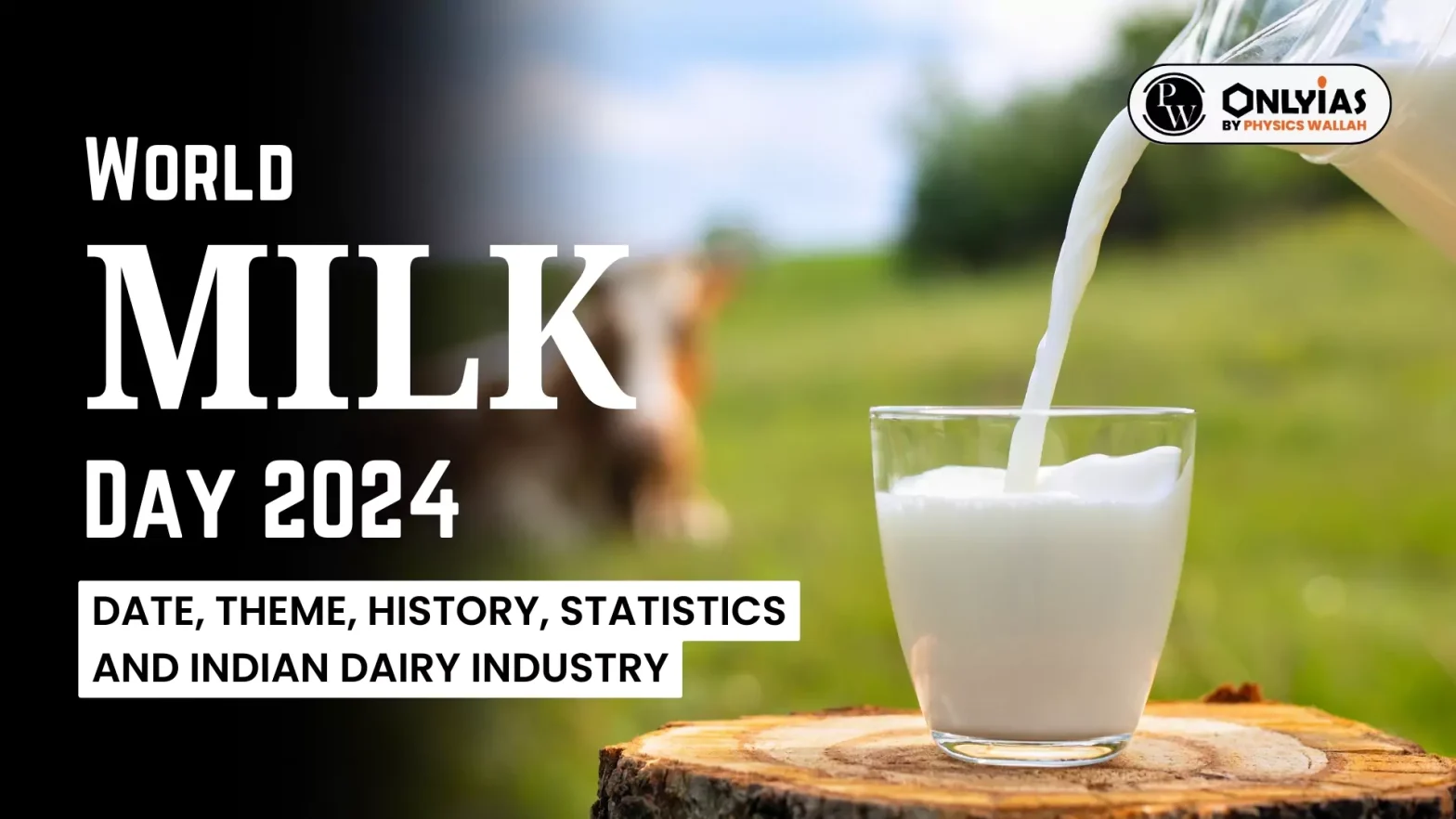World Milk Day 2024 will be celebrated on 1st June 2024 in Jamaica. Check out the Date, Theme, History, Significance and Statistics of the World Milk Day 2024.

World Milk Day 2024 will be celebrated on 1st June 2024. World Milk Day, celebrated on June 1st annually, was established by the Food and Agriculture Organization (FAO) of the United Nations in 2001.
World Milk Day 2024 highlights the importance of milk as a global food, recognizing its nutritional benefits and role in supporting the livelihoods of dairy farmers. It aims to raise awareness about the dairy sector’s contributions to sustainability, economic development, and providing a vital source of nutrients.
Let us have a look at the Date, Theme, Statistics and History of World Milk Day 2024. The information about the Milk Production in the World as well as India is also given, along with the significance of World Milk Day 2024.
On the Occasion of World Milk Day 2024, World Milk Day’s 13th anniversary will be celebrated, and the Jamaica Dairy Development Board is hosting an event on May 30, 2024, to commemorate this milestone. World Milk Day 2024 Jamaica will highlight the essential contribution of dairy production in offering quality nutrition to sustain the global population.
World Milk Day 2024 fosters appreciation for the dairy industry and promotes activities such as educational campaigns, milk donation events, and farm visits. The celebration spans across various themes each year, focusing on health benefits, environmental impact, and economic significance.
The theme of World Milk Day 2024 is focusing on “celebrating the vital role dairy plays in delivering quality nutrition to nourish the world.”
By celebrating milk, the World Milk Day 2024 also underscores the need for sustainable practices within the dairy industry to ensure that milk production can continue to support health and economies worldwide for future generations.
World Milk Day was established by Food and Agriculture Organization (FAO) of the United Nations (UN) to recognize the importance of milk as a global food. The celebration of this day also provides an opportunity to focus attention on milk and raise awareness about dairy’s part in healthy diets, sustainable food production, and supporting livelihoods and communities.
Let us have a look at some important aspects of Historical Background of World Milk Day 2024:
World Milk Day 2024 highlights the significant role milk and dairy products play in global nutrition and economies. The latest statistics indicate substantial growth in milk production worldwide.
Let us have a look at some important points of Global Milk Production as of 2024:
These trends underscore the importance of milk in the global food system, not only as a nutritional staple but also as a significant economic driver, particularly in rural areas of developing countries.
Let us have a look at some important points of Milk Production in India as of 2024:
Overall, while India continues to lead globally in milk production, ongoing efforts are focused on addressing productivity challenges and enhancing the infrastructure and processing capabilities of the dairy industry.
The dairy industry in India is the world’s largest, primarily driven by small-scale farmers. It significantly contributes to the economy, providing livelihood to millions. Despite challenges like fluctuating prices and infrastructure issues, the sector continues to grow, supported by government initiatives and rising domestic demand.
Let us have a look at some important aspects of the Dairy Industry in India:
The White Revolution in India, initiated in 1970, was a major national campaign to boost milk production, led by Dr. Verghese Kurien and the NDDB (National Dairy Development Board). Also known as Operation Flood, it transformed India into the world’s largest milk producer.
White Revolution in India involved creating a national milk grid, modernizing dairy farming, and improving marketing and distribution systems. This revolution empowered millions of rural dairy farmers, enhanced their income, and contributed significantly to rural development and nutrition in India. The Amul cooperative model played a pivotal role in this transformative movement.
Dr. Verghese Kurien, known as the “Father of the White Revolution” in India, was a pioneering social entrepreneur who transformed India’s dairy industry. Born on November 26, 1921, he founded the Gujarat Cooperative Milk Marketing Federation (GCMMF) and its brand, Amul.

His efforts earned him numerous accolades, including the Padma Vibhushan. Kurien’s legacy endures through the continued success of the cooperative movement. Dr. Verghese Kurien took his last breath on September 9, 2012.
The dairy industry benefits from various schemes and initiatives that aim to enhance milk production, improve dairy infrastructure, promote entrepreneurship, and preserve indigenous breeds, fostering sustainable growth and economic development in the dairy sector.
Let us have a look at some Important Schemes related to the Dairy Sector in India:
Let us have a look at some Key indices of Current stage of the Indian Dairy industry:
The Indian dairy industry is poised for substantial growth, with an anticipated market size of USD 380 billion by 2028, a significant rise from USD 182 billion in 2022.
In summary, World Milk Day serves as a global platform to celebrate milk and the dairy sector, emphasizing its nutritional, economic, and cultural importance. It also fosters discussions on sustainable practices and encourages the consumption of milk as part of a healthy diet.
| Must Read | |
| NCERT Notes For UPSC | UPSC Daily Current Affairs |
| UPSC Blogs | UPSC Daily Editorials |
| Daily Current Affairs Quiz | Daily Main Answer Writing |
| UPSC Mains Previous Year Papers | UPSC Test Series 2024 |
The theme of World Milk Day 2024 is to focus on celebrating the vital role dairy plays in delivering quality nutrition to nourish the world.
World Milk Day on June 1 celebrates the importance of milk in nutrition, highlighting its role in healthy diets, economies, and livelihoods worldwide. Established by the FAO, it promotes dairy's contributions to sustainability and well-being.
Raise a glass to World Milk Day, celebrating the nourishing goodness of milk and its vital role in promoting health and well-being worldwide. Let's honor the dairy industry's contributions to nutrition, agriculture, and livelihoods on this special occasion
World Milk Day 2024 is being celebrated in Jamaica. World Milk Day Jamaica 2024 will commemorate the crucial significance of dairy farming in ensuring the provision of nutritious sustenance to support global nourishment.
<div class="new-fform">
</div>